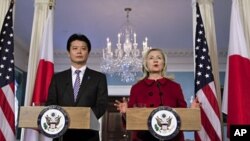U.S. Secretary of State Hillary Clinton and her Japanese counterpart, Foreign Minister Koichiro Gemba, on Monday urged a peaceful transition in North Korea following the death of North Korean leader Kim Jong Il. The development has delayed a U.S. decision on whether to provide new food aid to North Korea.
The meeting, held on Foreign Minister Gemba’s first Washington trip since taking office three months ago, was planned long before the announcement from Pyongyang.
But the death of Kim Jong Il dominated the discussion, with Clinton emerging to express hope that the transition underway in North Korea does not lead to regional turmoil.
Slideshow: World Reacts to Kim Jong Il's Death
“The foreign minister and I discussed the evolving situation on the Korean peninsula in light of reports from North Korea’s state-owned media on the death of Kim Jong Il," said Clinton. "We both share a common interest in a peaceful and stable transition in North Korea, as well as in insuring regional peace and stability.”
Clinton did not express condolences to the Pyongyang government but said the United States hopes for better relations with the North Korean people and said the United States remains deeply concerned about their well-being.
VOA's Ira Mellman Spoke With Joseph Cirincione, President Of The Plowshares Fund, A Security Foundation Focused On Nuclear Weapons Policy.
Heard through an interpreter, Foreign Minister Gemba stressed the need for close coordination with South Korea and other parties to the Chinese-sponsored six-party talks on North Korea’s nuclear program.
“We share the view that we should coordinate closely with six-party partners, and are also in agreement that all sides want stability and calmness during this period," said Gemba. "In addition, we also confirmed that we should maintain our close coordination among Japan, the United States and the Republic of Korea [South Korea] on the effort toward denuclearization of North Korea, in particular to ensure concrete actions [are] taken by North Korea.”
The six-party talks, in which North Korea agreed in principle in 2005 to disarm in return for economic and diplomatic benefits, have been stalled since 2008.
But the pace of contacts with Pyongyang has increased in recent months, including talks in Beijing last week between U.S. and North Korean officials on resuming American food aid to Pyongyang.
Recent news reports indicated that the United States was ready to resume food shipments for the first time in several years. But State Department Spokeswoman Victoria Nuland says potentially decisive U.S. consultations on the issue - planned for Monday - were postponed because of the death of the North Korean leader.
“We haven’t yet had those internal discussions. And again, we want to be respectful of the North Korean period of mourning," said Nuland. "We will obviously need to reengage at the right moment. But again, we haven’t made any internal decisions here.”
Nuland indicated that Mr. Kim's death has prompted the Obama administration to put off a decision on whether to dispatch special envoy for North Korea Glyn Davies on another round of bilateral talks with North Korean diplomats.
Davies was in Beijing last week for meetings with Chinese officials on prospects for restarting the nuclear negotiations.
